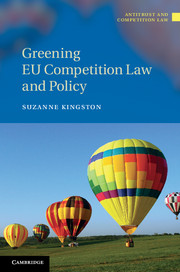Book contents
- Frontmatter
- Contents
- Foreword
- Acknowledgements
- Abbreviations
- Introduction
- Part I Should environmental goals play a role in EU competition law and policy?
- Part II The role of environmental protection in EU competition law and policy in practice
- 6 Some preliminary issues: definition of an undertaking; market definition; effect on inter-State trade
- 7 Article 101(1) TFEU
- 8 Article 101(3) TFEU
- 9 Article 102 TFEU
- 10 EU merger policy
- 11 The relevance of State action to Articles 101 and 102 TFEU
- 12 State aid
- Part III Conclusions
- Select bibliography
- Index
- References
12 - State aid
from Part II - The role of environmental protection in EU competition law and policy in practice
Published online by Cambridge University Press: 05 November 2011
- Frontmatter
- Contents
- Foreword
- Acknowledgements
- Abbreviations
- Introduction
- Part I Should environmental goals play a role in EU competition law and policy?
- Part II The role of environmental protection in EU competition law and policy in practice
- 6 Some preliminary issues: definition of an undertaking; market definition; effect on inter-State trade
- 7 Article 101(1) TFEU
- 8 Article 101(3) TFEU
- 9 Article 102 TFEU
- 10 EU merger policy
- 11 The relevance of State action to Articles 101 and 102 TFEU
- 12 State aid
- Part III Conclusions
- Select bibliography
- Index
- References
Summary
Introduction
While the previous chapter dealt mainly with EU competition law's response to non-monetary efforts by Member States to bolster undertakings' environmental activities, this chapter focuses on its response to monetary efforts. Environmental subsidies and taxes – which comprise a key environmental market instrument in many Member States' policies at present, as discussed in Chapter 2 – are dealt with under the Treaty State aid rules. Article 107(1) TFEU defines prohibited State aid as an advantage granted by a Member State or through State resources, which actually or potentially distorts competition, favours certain undertakings or the production of certain goods, and has an effect on trade between Member States. Articles 107(2) and 107(3) TFEU set out ways in which aid can be exempted from the prohibition.
From an analytical perspective, there is a fundamental difference between State aid control and the rest of EU competition policy: while State aid is in principle prohibited (Article 107(1) TFEU), the Article 107(2) and (3) TFEU ‘exemptions’ are premised on a recognition that markets may not always work properly when left alone – due, for example, to the presence of externalities – and may need some intervention from the State to work more effectively, and ultimately raise consumer welfare. As such, the Treaty expressly provides for certain non-economic reasons, which have been interpreted to include environmental reasons, to constitute legitimate justifications for the grant of State aid. In this sense, there are evident parallels between the Treaty State aid rules and the free movement rules of EU internal market law. Nonetheless, there has been a recent forceful drive by the Commission to develop a more economically rational approach to the conditions in which State aid may be justified.
- Type
- Chapter
- Information
- Greening EU Competition Law and Policy , pp. 379 - 434Publisher: Cambridge University PressPrint publication year: 2011



